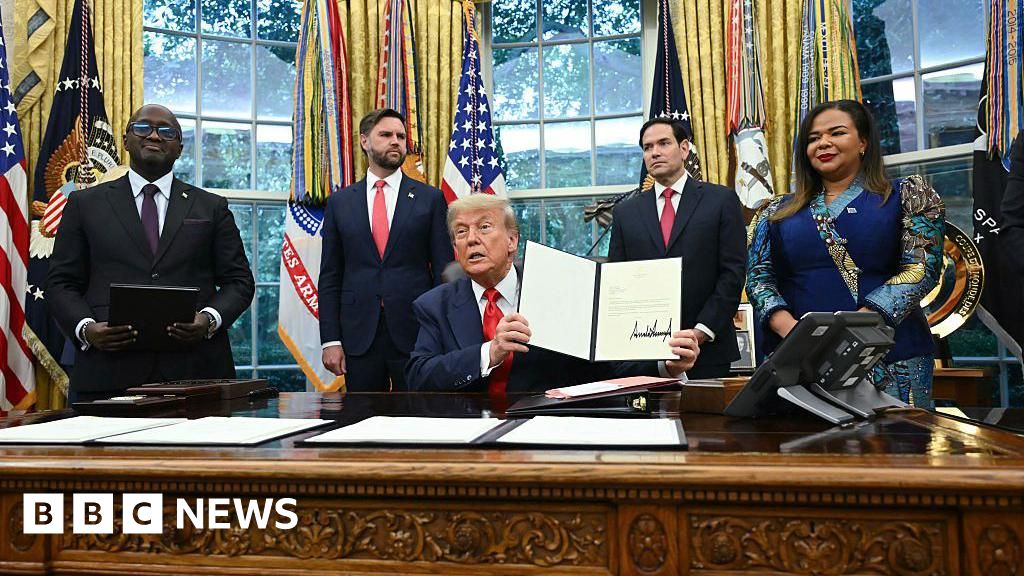DR Congo-Rwanda ceasefire deal still faces many challenges

DR Congo-Rwanda Ceasefire Deal Faces Deep Skepticism Despite US Backing
A US-brokered ceasefire agreement between the Democratic Republic of Congo (DRC) and Rwanda, aimed at de-escalating tensions in eastern DRC, faces significant challenges and widespread skepticism despite initial optimism. Signed on Friday, the deal commits both nations to disarming and disengaging their alleged proxy forces. However, the presence of numerous non-state armed groups and unresolved underlying issues threaten its long-term viability.
Dozens of Armed Groups Complicate Peace Efforts
Eastern DRC is plagued by the activity of dozens of armed groups, each with its own agenda and sources of funding. Just hours before the ceasefire was signed, the Codeco militia reportedly attacked a displaced persons camp in Ituri province, killing ten people. This incident underscores the difficulty of ensuring all groups adhere to the agreement. The deal's success hinges on the ability to bring these non-state actors under control, a task widely considered to be immensely difficult.
“The sheer number of armed groups operating in eastern DRC presents a monumental challenge," says Dr. Stephanie Wolters, a Senior Research Fellow at the South African Institute of International Affairs, specializing in conflict resolution in the Great Lakes region. "The deal lacks specific mechanisms for addressing the grievances and economic incentives that fuel these groups. Without a comprehensive approach that tackles these root causes, the ceasefire is unlikely to hold."
Economic Incentives and Mineral Wealth
The eastern DRC is rich in mineral resources, including those critical for the production of electric car and mobile phone batteries. This wealth provides strong economic incentives for rebel groups to control territory. The current agreement does not offer alternative economic opportunities that might persuade these groups to cease fighting. Integrating them into the already under-resourced Congolese armed forces is unlikely to be a sufficient deterrent.
US Interest and Mineral Access
The role of the United States in brokering the deal has raised questions about potential preferential access to DR Congo's mineral wealth. Reports suggest that former US President Donald Trump viewed securing access to these resources as a key incentive for supporting the peace process. Granting the US unfettered access, however, is unpopular within DR Congo, where many believe the country's resources have not benefited its citizens.
Rwanda's Role and Allegations of Support for M23
A central point of contention remains the alleged presence of Rwandan forces in eastern DRC. The US position is that Rwanda will withdraw its troops once the Forces Démocratiques de Libération du Rwanda (FDLR), a Hutu-led group that Rwanda claims is backed by DR Congo and aims to overthrow the Rwandan government, is dismantled. Rwanda has repeatedly denied its troops are present in eastern DR Congo, despite credible reports suggesting they actively support groups like M23 in the region.
According to Phil Clark, Professor of International Politics at SOAS University of London, "Rwanda's involvement in eastern DRC is a long-standing issue. While the FDLR poses a genuine security threat to Rwanda, the allegations of Rwandan support for M23 are deeply concerning and undermine the prospects for lasting peace. A transparent and verifiable withdrawal of all foreign forces is essential for building trust and stability."
Historical Context: A Region Marked by Conflict
The conflict in eastern DRC is rooted in a complex history of ethnic tensions, resource competition, and regional power struggles. The Rwandan genocide of 1994 had a profound impact, leading to the influx of refugees and the emergence of armed groups in eastern DRC. Since then, the region has been plagued by recurring cycles of violence, with devastating consequences for the civilian population. Millions have been displaced, and human rights abuses are widespread.
Displacement and Humanitarian Crisis
Part of the peace deal aims to create conditions for the return of hundreds of thousands of people displaced by the conflict. However, this will not be possible without a complete cessation of hostilities. The humanitarian situation in eastern DRC remains dire, with many displaced people lacking access to basic necessities such as food, water, and shelter. The recent attack on the displaced persons camp serves as a stark reminder of the vulnerability of this population.
Future Prospects and Challenges
The DR Congo-Rwanda ceasefire deal represents a potentially important step towards de-escalation. However, its success depends on addressing the underlying causes of the conflict, disarming and demobilizing armed groups, and ensuring the protection of civilians. The international community, including the United States, must play a constructive role in supporting these efforts. Without a comprehensive and sustained commitment, the ceasefire is unlikely to bring lasting peace to eastern DRC.
Originally sourced from: BBC News Africa
